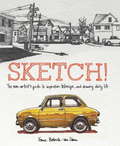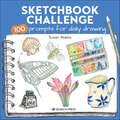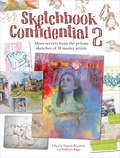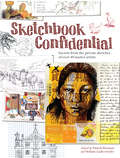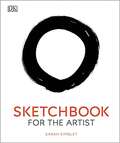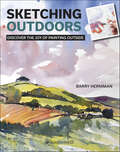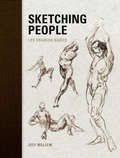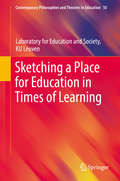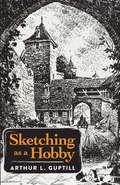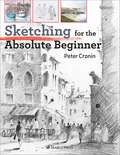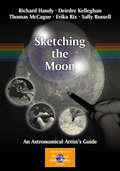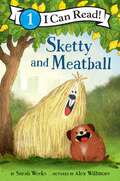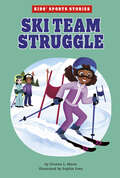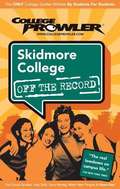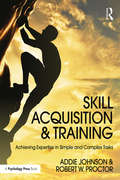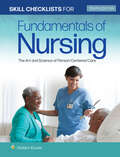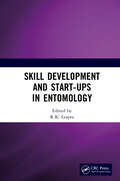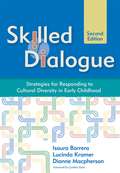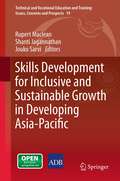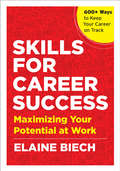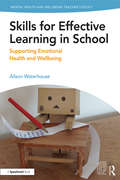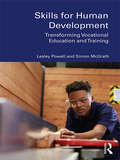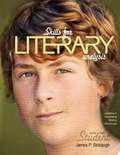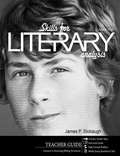- Table View
- List View
Sketch!
by France Belleville-Van StoneAn inspirational manual for integrating sketching into daily life for artists and non-artists alike. Urban sketching--the process of sketching on the go as a regular practice--is a hot trend in the drawing world. In this aspirational guide, French artist France Belleville-Van Stone offers motivation to move beyond the comfort zone, as well as instruction on turning rough sketches into finished work. By sharing her own creative process, which includes sketching by hand and digitally, Belleville-Van Stone emboldens readers to craft a method of their own and devote more time to art, even if it's just 10 minutes a day. Sketch will inspire artists both established and aspiring to rethink their daily practice, sketch for the pure joy of it, and document their lives and the world around them.From the Trade Paperback edition.
Sketchbook Challenge: 100 Prompts for Daily Drawing
by Susan YeatesKickstart or develop your own daily sketching habit with 100 simple and thought-provoking prompts from the creator of the 30-Day Sketchbook Challenge.The huge range of prompts includes found objects such as leaves, clocks, buttons and jewellery, along with more subjective suggestions such as 'something that smells good' and 'items in your pocket', to encourage you to sketch everyday items you may not have considered before.All of the challenges are suitable for beginners and teaches the principles of drawing and art, with the aim of encouraging people to relax, have fun, and get creative!At the start of the book Susan provides an introduction explaining why she has written the book, how to use it, and the benefits and reasons for cultivating a daily sketching habit. There is also a simple chapter on tools and materials, followed by a consideration of mindset and creativity when approaching the 100 prompts.Also included are some warm-up exercises to help awaken the creative brain and inspire you to think more broadly about the prompts that she provides. The book is illustrated throughout with Susan's own responses to the prompts, in a mix of black and white sketches in pen or pencil, plus coloured illustrations, paintings and even collage – all intended to add interest, to inspire, and to enliven the reader.
Sketchbook Confidential 2: Enter the secret worlds of 41 master artists
by Pamela Wissman Stefanie LaufersweilerMore secrets from the private sketches of 38 master artists The idea may be derived from anything really--a flash of sunlight, the tilt of a head, a glass on the table...but the sketch is where it all begins, the point where inspiration meets artist. Gloriously free of the need to get it "right," the sketch is where possibilities are explored, compositions are found, and visions come to life. A brilliant follow-up to the first Sketchbook Confidential, this book grants you access to 38 of art's most creative minds via their sketchbooks. Whether created in studios, subways or the middle of a farmyard, these sketches represent art in its raw form. Up until now, this work has been tucked inside drawers or on studio bookshelves. Now the artists lay it out for all to see, along with intimate musings on the art of sketching and how it helps them commune with a subject, find their path to a finished piece or discover even greater rewards in the journey itself.
Sketchbook Confidential: Secrets from the private sketches of over 40 master artists
by Editors of North Light BooksPulsing with ideas, energy and inspiration, Sketchbook Confidential offers a rare peek inside the personal sketchbooks of 40+ master artists. From colorful painted sketches to spontaneous napkin doodles, from the intensely personal to the purely whimsical, most of the work here was produced quickly and never intended for public view. It is honest and immediate, fresh and fearless.In their own words, the artists share the intentions and inspirations behind their sketching. For some, it is a cherished, everyday habit - a way of wandering through the ideas in their mind, playing around with new subjects, or just having some anything-goes kind of fun. For others, sketching is a deliberate tool for problem-solving - working through a composition, capturing a moment's light or test-driving a color scheme.As you turn the pages you'll be immersed in the creative processes of these individuals, arriving on the other side with a feeling of kinship and a renewed desire to boldly capture life in your own sketchbooks!
Sketchbook For The Artist: An Innovative, Practical Approach To Drawing The World Around You
by Sarah SimbletDevelop your drawing skills and rediscover the world around you with this innovative and beautifully illustrated book. In Sketch Book for the Artist, acclaimed artist and teacher Sarah Simblet teaches you how to draw by combining practical lessons with examples of both her own work and some of the world's greatest drawings. She introduces all the key drawing materials, then shows you how to master the basic elements of drawing in a series of step-by-step drawing classes, covering topics ranging from simple mark-making to establishing form, creating tone, and conveying perspective. You will learn how to explore a wide variety of subjects, from still life, plants, and animals to portraits, the human body, landscapes, and buildings, all of which are introduced with outstanding drawings by famous artists. The bestselling author of Anatomy for the Artist and Botany for the Artist, Sarah demonstrates how she works - from quick pencil sketches to pen and ink studies - with expertise and plenty of encouraging tips, and complements them with plentiful examples from her own drawing books. Sketch Book for the Artist is for anyone who wants to draw, whether you are a complete beginner or would like to refresh your existing skills. Whatever your ability, it will inspire you to reach for a pencil and paper and start drawing.
Sketching Outdoors: Discover the Joy of Painting Outside
by Barry HernimanPack up your materials, leave your painting inhibitions behind and step outside with Barry Herniman, ready to sketch.Fun, friendly and practical, this handbook is jam-packed with tips and brimming with answers to questions such as: What should I take? Where should I go? What medium should I use? Where can I find inspiration?This is a handy book you will keep close by for reference time and again. It is full of inspiring artwork as well as five demos: a coastal scene in pen and ink; a countryside panorama in watercolour; a quintessential English village in gouache; a townscape in line and watercolour wash; and trees in watercolour pencils.What comes across in every detail is the joy Barry experiences when he's sketching outside: it's contagious! He encourages you to absorb your surroundings, be aware of the input from your senses and have a go at capturing the moment in sketch. He addresses the challenges and opportunities you will face as an artist and teaches you to understand the importance of a sketchbook. Enjoyment is key – shake off peer pressure and your own expectations and enter the exhilarating world of sketching outdoors.
Sketching People: Life Drawing Basics
by Jeff MellemLife Lessons: Learn How to Capture a World Constantly in Motion Fluid, fast and expressive life drawing starts here. Step by step, you'll learn to render fleeting gestures from memory, capture expressions simply and more quickly, give your drawing a life of its own with body language, and more. Along the way, you'll develop a more spontaneous approach for successfully working from life. Inside you'll find: A comprehensive course on drawing from life, based on classic principles Essential techniques for drawing gesture, figures, clothing, expression, body language and more Lots of exercises that bring lessons to life The skills you'll learn from this book are so fundamental that every artist will find something in these useful lessons for making the most of all the inspiration that life has to offer.
Sketching a Place for Education in Times of Learning (Contemporary Philosophies And Theories In Education Ser. #10)
by Society Laboratory For EducationThis book explores how traditional institutions of education are affected by the current discourse and practices of ‘learning’; and more specifically, how the evolution towards so-called ‘learning environments’ affects the kind of gathering or association that is staged and configured within families, schools and universities. In addition, it addresses the question of how to articulate what is educational in the context of ‘making’ family, school or university, and to what extent this making is always also a public act. The aim is to approach and investigate family, school and university as educational practices, to focus on the forms of gatherings or associations that take shape within them, and to explore the public, but also possible ‘privatizing’ character of these aspects. The book presents a diverse range of sketches intended as preparatory study exercises. What they all share, despite the different hands and eyes, and the different sensitivities, is the attempt to figure out what education is all about. Three objectives can be distinguished for the sketches: a cartographic one (to map the discourse of learning but also the discursive and material arrangements of actual educational practices), a morphological one (to describe the educational forms of gathering) and a theoretical one (to bring educational issues into the discussion). The book’s overall aims are to re-establish ‘the educational’ as an issue; to make it visible, to give it shape, to give it a voice, and to make it a thing that can and should be discussed, thus establishing a point of departure for further inquiry and its (re)invention.
Sketching as a Hobby
by Arthur L. GuptillTailored to both beginner- and intermediate-level illustrators, this highly enjoyable guide and reference was written by Arthur L. Guptill, co-founder of Watson-Guptill Publications and one of the leading art instruction authors of the twentieth century. Filled with tips, methods, and techniques on outlining, shading, stippling, portraiture, and much more, this fully illustrated introduction will help readers develop their drawing and sketching skills according to their abilities and interests. <p><p> Starting with the representation of forms, values of light and dark, and the interpretation of color, the guide progresses from elementary to advanced considerations, with explanations and illustrations for each step. Pencil, crayon, charcoal, pen and ink, wash, and watercolor techniques are examined, along with a variety of unique methods that achieve original effects. Intended chiefly for enjoyment rather than commercial application, the book focuses on the sketching of objects, outdoor subjects, landscapes, animals, and people. Readers are encouraged to think for themselves and to experiment in order to develop a natural and individual style.
Sketching for the Absolute Beginner
by Peter CroninFrom the author of the best-selling art book, Pure Watercolour Painting and guest judge on Channel 5's Watercolour Challenge, Peter Cronin.Sketching is more than just drawing quickly. It is training your eye and hand to work together, to respond immediately and naturally to the scene before you. Starting from a clear, simple method to bring all the senses into play, successful author and acclaimed artist Peter Cronin shows the reader how to bring artistry and economy to their sketching; making for swift and impressive results. Whether sketching as the basis for painting, or simply for pleasure, this book teaches the reader all they need to know.Numerous simple step-by-step exercises as well as larger projects lead the complete beginner through the book, building towards more complex and rewarding artworks. The book teaches how to sketch with a range of media, starting from graphite pencil and including information and exercises on charcoal, pen and ink and others. In the best-selling Absolute Beginner series, this book is suitable for absolutely everybody who wants to take their sketching skills further and become an accomplished artist.
Sketching the Moon: An Astronomical Artist's Guide
by Sally Russell Deirdre Kelleghan Erika Rix Richard Handy Thomas MccagueFor anyone artistically inclined, observing the Moon and attempting to sketch or paint it can easily become a passion. The Moon presents a broad array of tone, texture, and form. Capturing this in a painting or sketch at the eyepiece of a telescope - or even with binoculars - develops observational skills, leaves a record of the observation, and can also be a delightful and rewarding pastime. However, the choice of media available is extensive (acrylic paint, oils, pen, charcoal, etc., and even computer art programs), and there is no existing text that fully explains all lunar sketching and painting techniques in each respective medium. This beautiful and graphically rich book fulfills this requirement. It presents detailed step-by-step instructions, in the form of illustrated tutorials for every major medium employed to represent the Moon. It also provides practical advice on how to sketch outdoors at night (not ideal conditions for an artist!). This is easily the most extensive book on the subject of lunar art for amateur astronomers, particularly those observing through a telescope. The diverse features of the lunar surface will attract and entice readers to review the number of different media presented, exciting and inspiring them with the possibilities of learning to depict all of the fascinating aspects of Earth's very own satellite.
Sketty and Meatball (I Can Read Level 1)
by Sarah Weeks"A pair we would happily hang out with again." —Kirkus ReviewsFrom Sarah Weeks, creator of the beloved series Mac and Cheese, comes Sketty and Meatball, a Level One I Can Read about two irrepressible dog best friends.Best friends Sketty and Meatball do everything together. They play together. They bark together. If Sketty sniffs a flower, Meatball sniffs a flower too. If Meatball wags his tail, Sketty’s tail is wagging too.Young readers will be delighted by two pals called Sketty and Meatball, who happen to look quite a bit like their names.Sketty and Meatball is a Level One I Can Read book, which means it’s perfect for children learning to sound out words and sentences. Whether shared at home or in a classroom, the short sentences, familiar words, and simple concepts of Level One books support success for children eager to start reading on their own.
Ski Team Struggle (Kids' Sports Stories)
by Dionna L. MannMaddie loves being on the ski team with her friend Sarah. Sarah is the fastest skier on the team. Maddie wants to beat Sarah’s time but is having trouble. She takes her frustrations out on Sarah. Will Maddie realize that she needs to stop comparing herself to others before she ruins her friendship with Sarah?
Skidmore College (College Prowler)
by Cara Jones Nicolette Kyle StewartNo university affiliations. No half-truths. No out-of-touch authors who haven't been in school for decades. A class project turned company, College Prowler produces guidebooks that are written by actual college students and cover the things students really want to know. Unlike other guides that jam everything into a five-pound book and devote only two pages to each college, our single-school guidebooks give students only the schools they want and all the information they need. From academics and diversity to nightlife and sports, we let the students tell it how it is. In addition to editorial reviews and grades for 20 different topics, more than 80 percent of each guide is composed of actual student reviews of their school. Whether readers are looking for "Best and Worst" lists, "Did You Knows?" or traditions, College Prowler guides have it all. Our books are the only place for local slang, urban legends, and tips on the best places to find a date, study, or grab a bite to eat.
Skill Acquisition and Training: Achieving Expertise in Simple and Complex Tasks
by Addie Johnson Robert W. ProctorSkill Acquisition and Training describes the building blocks of cognitive, motor, and teamwork skills, and the factors to take into account in training them. The basic processes of perception, cognition and action that provide the foundation for understanding skilled performance are discussed in the context of complex task requirements, individual differences, and extreme environmental demands. The role of attention in perceiving, selecting, and becoming aware of information, in learning new information, and in performance is described in the context of specific skills.A theme throughout this book is that much learning is implicit; the types of knowledge and relations that can profitably be learned implicitly and the conditions under which this learning benefits performance are discussed. The question of whether skill acquisition in cognitive domains shares underlying mechanisms with the acquisition of perceptual and motor skills is also addressed with a view to identifying commonalities that allow for widely applicable, general theories of skill acquisition. Because the complexity of real-world environments puts demands on the individual to adapt to new circumstances, the question of how skills research can be applied to organizational training contexts is an important one. To address this, this book dedicates much content to practical applications, covering such issues as how training needs can be captured with task and job analyses and how to maximize training transfer by taking trainee self-efficacy and goal orientation into account.This comprehensive yet readable textbook is optimized for students of cognitive psychology looking to understand the intricacies of skill acquisition.
Skill Checklists for Fundamentals of Nursing: The Art and Science of Person-Centered Care
by Carol R. TaylorSkill Checklists for Fundamentals of Nursing help you practice and record the mastery of every step of each skill found in Fundamentals of Nursing: The Art and Science of Person-Centered Care, Tenth Edition. It serves as a valuable self-assessment tool for students as well as a convenient tool for faculty to record student performance.
Skill Development and Start-Ups in Entomology
by R. K. GuptaSkill Development and Start-Ups in Entomology provides information on all the possible entrepreneurial avenues that would cater to the needs of educated but unemployed entomologists. It directs the reader towards the diverse sources of income generation in entomology and discusses multidirectional pathways for them based on their individual interests, funds, and assets.The subject matter of this book includes: Entrepreneurship in Productive Insects and Their Products Taxonomist and Museum Curator Web Developers and Tech Preneurs Forensic Entomologist Insect Tourism and Photography as Profession Print edition not for sale in South Asia (India, Sri Lanka, Nepal, Bangladesh, Pakistan or Bhutan)
Skilled Dialogue: Strategies for Responding to Cultural Diversity in Early Childhood
by Isaura Barrera Lucinda Kramer Dianne MacphersonHow can early childhood practitioners best respond to cultural and linguistic diversity and ensure positive interactions with all children and families? Discover the power of Skilled Dialogue, a unique, effective, and field-tested model for interactions that honor the cultural beliefs and values of everyone involved. <P><P> Going far beyond the fundamentals introduced in the first edition of this book, the fully updated second edition incorporates expanded coverage of today's most critical topics and reflects the real-world feedback of seasoned Skilled Dialogue users. With this proven model for respectful, reciprocal, and responsive communication, pre- and inservice educators and interventionists will <P><P> <li>understand culture as a dynamic that shapes the behaviors and beliefs of all people <li>actively communicate respect for what others believe, think, and value <li>resolve issues creatively by integrating diverse perspectives from all parties <li>strengthen inclusive assessment and instruction <li>reframe differences between practitioners and families as complementary, not contradictory <li>leverage cultural diversity as a strength rather than a "problem" or risk factor <li>avoid stereotypes based on culture and ethnicity <li>gain critical insight into the effects of trauma and how it interacts with culture establish collaborative relationships rather than seeking control over others <P><P>To support professionals as they put Skilled Dialogue into practice, this edition includes more explicit guidance, vivid examples, and practical photocopiable forms to aid with assessment, instruction, and organization of key family and child information. <P><P> With this comprehensive guide to a positive, highly effective model, early childhood professionals will establish skillful interactions that honor all cultures and perspectives--leading to stronger working relationships and better outcomes for whole families.
Skills Development for Inclusive and Sustainable Growth in Developing Asia-Pacific (Technical and Vocational Education and Training: Issues, Concerns and Prospects #19)
by Rupert Maclean Jouko Sarvi Shanti JagannathanFocusing on the Asia-Pacific region, which in recent years has been the engine of global economic growth , this volume surveys trends and prospects in technical and vocational education and training (TVET) with particular reference to achieving inclusive growth and the greening of economies. Underlying the increasing pressure for new models of TVET provision is the rapid pace of technological change, demand for a work force which is highly responsive to evolving needs and a transforming market place that calls for higher order skills and lifelong learning. The book proposes a re-engineered, modernized TVET system that fosters an innovative approach which enhances the employability of workers as well as the sustainability of their livelihoods. The book includes contributions from leading policy makers, researchers, and practitioners, including those in the private sector in analyzing and forecasting the most urgent priorities in skills development. The book argues for creative approaches to TVET design and delivery particularly with a view to improve job prospects , and meeting the goals of inclusion, sustainable development and social cohesion. Addressing issues such as the chronic mismatches between skills acquired and actual skills required in the work place, the volume proposes diversified approaches towards workforce development and partnerships with the private sector to improve the quality and relevance of skills development . The new imperatives created by 'greening' economies and responses required in skills development and training are addressed. Developing TVET is a high priority for governments in the Asia Pacific region as they seek to achieve long-term sustainable growth since the .continued success of their economic destinies depend on it. The volume also includes an emerging framework for skills development for inclusive and sustainable growth in the Asia and Pacific region.
Skills and Inequality
by Marius R. BusemeyerSkills and Inequality studies the political economy of education and training reforms from the perspective of comparative welfare state research. Highlighting the striking similarities between established worlds of welfare capitalism and educational regimes, Marius R. Busemeyer argues that both have similar political origins in the postwar period. He identifies partisan politics and different varieties of capitalism as crucial factors shaping choices about the institutional design of post-secondary education. The political and institutional survival of vocational education and training as an alternative to academic higher education is then found to play an important role in the later development of skill regimes. Busemeyer also studies the effects of educational institutions on social inequality and patterns of public opinion on the welfare state and education. Adopting a multi-method approach, this book combines historical case studies of Sweden, Germany, and the United Kingdom with quantitative analyses of macro-level aggregate data and micro-level survey data.
Skills for Career Success: Maximizing Your Potential at Work
by Elaine BiechThis career development tool kit is for people who want to take charge of their own professional futures.If you want to have a career that is meaningful and inspires you, you must prepare for it the same way you would a marathon—developing an overall training plan to carry you through to race day and beyond. This is especially important in today's unpredictable work world, where organizations are in a state of constant flux, and many have either eliminated their employee development programs or adopted a generic, one-size-fits-all approach.Skills for Career Success maps the strategies and skills you will need to take responsibility for your own future. It provides an overview of career development basics, including how to write an Individual Development Plan (IDP) that is practical and useful to you. The core of the book is an easy-to-navigate catalog of fifty-one critical skills, such as communicating clearly, adapting to situations, advocating for yourself, managing time, and selling your ideas. For each skill, there are actions you can take immediately, ongoing practices, and long-term goals. Beyond the skills, there is advice for keeping your career on track, mapping a path beyond your current job, overcoming personal roadblocks, finding your passion at work, and initiating talent conversations with your manager. There are also guidelines for managers who want to bring out the best in their people.
Skills for Effective Learning in School: Supporting Emotional Health and Wellbeing (Mental Health and Wellbeing Teacher Toolkit)
by Alison WaterhouseOne of the five books in the Mental Health and Wellbeing Teacher Toolkit, this practical resource focuses on the topic of ‘Skills for Learning’. The book offers research-driven, practical strategies, resources and lesson plans to support educators and health professionals. This is a resource book for practitioners looking to have a positive impact on the mental health and wellbeing of the children and young people in their care; both now and in the future. Chapters span key topics including Metacognition, Learning Dimensions, Problem Solving and Cognitive Strategies. A complete toolkit for teachers and counsellors, this book offers: • Easy to follow and flexible lesson plans that can be adapted and personalised for use in lessons or smaller groups or 1:1 work • Resources that are linked to the PSHE and Wellbeing curriculum for KS1, KS2 and KS3 • New research, ‘Circles for Learning’, where the introduction of baby observation into the classroom by a teacher is used to understand and develop self-awareness, skills for learning, relationships, neuroscience and awareness of others • Sections on the development of key skills in communication, skills for learning, collaboration, empathy and self-confidence • Learning links, learning objectives and reflection questions. Offering research-driven, practical strategies and lesson plans, Skills for Effective Learning in School is an essential resource book for educators and health professionals looking to have a positive impact on the mental health and wellbeing of the children in their care; both now and in the future.
Skills for Human Development: Transforming Vocational Education and Training
by Simon McGrath Lesley Joy PowellFocusing on reimagining the purpose of vocational education and training (VET) and grounded in the reality of a small cohort of young South Africans and an institution seeking to serve them, Skills for Human Development moves beyond the inadequacies of the dominant human capital orthodoxy to present a rich theoretical and practical alternative for VET. Offering a human development and capability approach, it brings social justice to the forefront of the discussion of VET’s purpose at the national, institutional and individual levels. In doing so, this book insists that VET should be about enlarging peoples’ opportunities to live a flourishing life, rather than simply being about narrow employability and productivity. It argues that human development approaches, while acknowledging the importance of work in its broadest sense, offer a better way of bringing together VET and development than the current human capital-inspired orthodoxy. Offering a transformative vision for skills development, this book: Considers the potential contribution skills development could make to broader human development, as well as to economic development Points to an alternative approach to the current and flawed deficit assumptions of VET learners Presents for the first time an alternative evaluative frame for judging VET purpose and quality Presents a timely account of current vocational and education training that is high on the agenda of international policymakers Taking a broad perspective, Skills for Human Development presents a comprehensive and unique framework which bridges theory, policy and practice to give VET institutions a new way of thinking about their practice, and VET policymakers a new way of engaging with global messages of sustainable human development. It is a vital resource for those working on the human development and skills approach in multiple disciplines and offers a grounding framework for international policymakers interested in this growing area.
Skills for Literary Analysis (Student)
by James P. StobaughEquips high school students to analyze classic literary genres, discern author's worldviews, and apply biblical standards. Helps you build vocabulary by using new words in every speech and essay. Gain in-depth instruction in the subjects of grammar, punctuation, and spelling. Learn to convey important ideas in both writing and speech in this easy-to-follow, daily format. This is a dialectic and logic level course that prepares students for later academic pursuits. This 35-week course presents diverse writings, from Shakespeare to Jack London, Lewis Carrol to Longfellow, and Sir Walter Scott to C.S. Lewis. Students are taught to analyze key elements of literature such as allegory narrative, satire, plot, setting, and more. While Dr. Stobaugh scrutinizes all literature from a Christian worldview, his instruction also helps students develop their skills in public speaking, writing, and discernment to empower them to be more effective Christian apologists. In the steps of Augustine, Milton, and Lewis, students are invited to analyze the classics with a keen, discerning eye, and to identify positive and negative components of literary worldviews emergent among the classics.
Skills for Literary Analysis (Teacher)
by James P. StobaughThe Teacher Guide for Skills for Literary Analysis: Lessons in Assessing Writing Structures.
